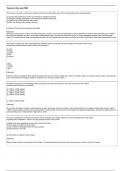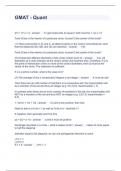-
1. Exam (elaborations) - Saunders nutrition practice questions exam 2
-
2. Exam (elaborations) - Nclex- nutrition for nursing with complete solutions| complete questions and 100% cor...
-
3. Exam (elaborations) - Nclex questions nutrition final with complete solutions| complete questions and 100% ...
-
4. Exam (elaborations) - Nutrition, management of care, skin integrity and wound care, nursing process critica...
-
5. Exam (elaborations) - Nutrition and nutritional care support questions with complete solutions| complete qu...
-
6. Exam (elaborations) - Nclex nutrition study set questions and 100% correct answers
-
7. Exam (elaborations) - Nclex exam nutrition questions and 100% correct answers
-
8. Exam (elaborations) - Evolve nutrition questions complete solutions| complete questions and 100% correct an...
-
9. Exam (elaborations) - Nutrition exam 1 answers, community health -nclex questions with complete solutions| ...
-
10. Exam (elaborations) - Nclex questions for perioperative nursing, nutrition, bowel elimination, & oxygenatio...
-
11. Exam (elaborations) - Nclex nutrition questions and 100% correct rationale answers
-
12. Exam (elaborations) - Nclex pn - nutrition nclex questions with complete solutions| complete questions and ...
-
13. Exam (elaborations) - Nclex nutrition questions comprehensive fundamentals of nursing
-
14. Exam (elaborations) - Nclex nutrition practice questions with complete rationale solutions| complete questi...
-
15. Exam (elaborations) - Med surg (gi gu) exam 1 nutrition nclex with complete solutions| complete questions a...
-
16. Exam (elaborations) - Gi & parenteral nutrition nclex with complete solutions| complete questions and 100% ...
-
17. Exam (elaborations) - Gi & nutrition nclex with complete solutions| complete questions and 100% correct ans...
-
18. Exam (elaborations) - Fundamentals nutrition review questions with complete solutions| complete questions a...
-
19. Exam (elaborations) - Fund. exam 2 nutrition questions with complete solutions| complete questions and 100%...
-
20. Exam (elaborations) - Nutrition exam questions with complete solutions| complete questions and 100% correc...
-
21. Exam (elaborations) - Nutrition for nursing exam 3 practice questions with complete rationale solutions| co...
-
22. Exam (elaborations) - Nutrition nclex with complete solutions| complete questions and 100% correct answers
-
23. Exam (elaborations) - Nutrition practice problems with complete solutions| complete questions and 100% corr...
-
24. Exam (elaborations) - Nutrition nclex with complete rationale solutions| complete questions and 100% correc...
-
25. Exam (elaborations) - Questions with complete rationale solutions| complete questions and 100% correct answ...
-
26. Exam (elaborations) - Nclex questions (maternity-newborn nursing)
-
27. Exam (elaborations) - Maternal and fetal nutrition nclex questions with complete rationale solutions| compl...
-
28. Exam (elaborations) - Nutrition questions with complete rationale solutions| complete questions and 100% co...
-
29. Exam (elaborations) - Cancer nutrition nclex style questions with complete rationale solutions| complete qu...
-
30. Exam (elaborations) - Ati nutrition practice questions with complete rationale solutions| complete question...
-
31. Exam (elaborations) - Nursing 101 exam 4 – nutrition questions with complete rationale solutions| complet...
-
32. Exam (elaborations) - Nur 111 nutrition pearson study guide questions with complete rationale solutions| co...
-
33. Exam (elaborations) - Nsg 100 - nutrition nclex questions with complete solutions| complete questions and 1...
-
34. Exam (elaborations) - Nln nutrition-practice questions with complete solutions| complete questions and 100%...
-
35. Exam (elaborations) - Nclex taylor nursing questions with complete rationale solutions| complete questions ...
-
36. Exam (elaborations) - Nclex questions-nutrition with complete rationale solutions| complete questions and 1...
-
37. Exam (elaborations) - Nurs1410_ unit ii enteral and parenteral nutrition nclex style questions
-
38. Exam (elaborations) - Nursing- nutrition nclex questions with complete rationale solutions| complete questi...
-
39. Exam (elaborations) - Nutrition & elimination nclex style nursing questions - fundamentals
-
40. Exam (elaborations) - Nutrition and tissue integrity nclex questions with complete rationale solutions| com...
-
41. Exam (elaborations) - Nutrition questions with complete rationale solutions| complete questions and 100% co...
-
42. Exam (elaborations) - Nutrition essentials for nursing practice study questions
-
43. Exam (elaborations) - Nutrition exam 1 practice questions with complete rationale solutions| complete quest...
-
44. Exam (elaborations) - Nutrition fadavis questions
-
45. Exam (elaborations) - Nutrition nclex questions with complete solutions| complete questions and 100% correc...
-
46. Exam (elaborations) - Nutrition nclex questions with complete solutions| complete questions and 100% correc...
-
47. Exam (elaborations) - Nutrition nclex questions with complete solutions| questions and 100% correct answers
-
48. Exam (elaborations) - Nutrition nclex questions with complete rationale solutions| questions and 100% corre...
-
49. Exam (elaborations) - Nutrition nclex questions with complete solutions| questions and 100% correct answers
-
50. Exam (elaborations) - Nutrition nclex questions with complete solutions| questions and 100% correct answers
-
51. Exam (elaborations) - Nutrition nursing questions with rationales| questions and 100% correct answers
-
52. Exam (elaborations) - Nutrition nursing -- practice questions
-
53. Exam (elaborations) - Nutrition nursing questions with rationales
-
54. Exam (elaborations) - Nutrition quiz questions evolve
-
55. Exam (elaborations) - Nutrition, digestion, and elimination nclex questions
-
56. Exam (elaborations) - Nutrition nclex questions with complete solutions
-
57. Exam (elaborations) - Nutritional assessment nclex practice
-
58. Exam (elaborations) - Nutritional concepts and related therapies (nclex questions) with complete solutions
-
59. Exam (elaborations) - Pharm. 2 nclex questions with complete solutions
-
60. Exam (elaborations) - Midterm nutrition nclex questions with complete rationale solutions
-
61. Exam (elaborations) - Week 7 parenteral nutrition nclex questions
-
Show more





